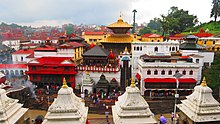This article needs additional citations for verification. (July 2019) |
Religion in Nepal (2023)[1]

Religion in Nepal encompasses a wide diversity of groups and beliefs.[2] Nepal is a secular nation and secularism in Nepal under the Interim constitution (Part 1, Article 4) is defined as "Religious and cultural freedom along with the protection of religion and culture handed down from time immemorial." That is, "The state government is bound for protecting and fostering Hindu religion while maintaining "Religious" and "Cultural" freedom throughout the nation as fundamental rights.[3][4][5]
Hinduism is the majority religion in Nepal and profoundly influences its social structure and politics, while Buddhism (Tibetan Buddhism) is practiced by some ethnic groups (such as the Newar people) in forms that are strongly influenced by Hinduism. Kiratism is the indigenous religion of the population belonging to the Kirati ethnicity. Small populations, especially in eastern Nepal, adhere to Islam, Christianity, Sikhism, Jainism, Bön, and the Baháʼí Faith.
Nepal is home to one of the largest Hindu populations in the world.[6][7] A number of prominent Hindu pilgrimage sites are located in Nepal, such as Pashupatinath Temple, a UNESCO World Heritage Site. According to the Hindu epic Ramayana, the goddess Sita was born in the Mithila Kingdom of King Janaka.[8] The national animal of Nepal is the cow,[9] which is considered a sacred animal in Hinduism,[10] and the slaughter of cows is illegal in Nepal.[11]
Nepal is considered the birthplace of Siddhartha Gautama (the Buddha). As such, Buddhism has a special place in the country and is intertwined with Hinduism in some communities.[7][12][13]
The Nepali constitution guarantees freedom of religion. Forced conversion from Hinduism to other religions is against the law, especially when money is used as a direct or indirect incentive to convert. Prior to the movement for democracy in early 2006 and the sacking of King Gyanendra in 2008, the country was officially a Hindu kingdom, and the constitution still protects and fosters the Hindu religion. Nationalists have sometimes protested against secularism, and some wish to see Nepal become a Hindu-Democratic state.[14] Senior minister Prem Ale has advocated for constitutionally declaring Nepal a Hindu state.[15]
- ^ National Statistics Office (2024). National Population and Housing Census 2021: Population Composition of Nepal (PDF). National Statistics Office, Nepal. p. 52. Retrieved 18 May 2024.
- ^ Interim Constitution of Nepal - Equal Rights Trust
- ^ "The Interim constitution of Nepal (2015), privileges Hinduism as the state sponsored religion". Scroll In. 20 September 2015. Archived from the original on 2021-07-19. Retrieved 2021-05-06.
- ^ "Constitution of Nepal". Nepal Law Commission. Archived from the original on 2021-07-14. Retrieved 2021-07-21.
- ^ "A history of religion in Nepal". Archived from the original on 2021-07-09. Retrieved 2021-07-21.
- ^ World Atlas, 2019 report, Retrieved 2023-04-26
- ^ a b "South Asia : Nepal". The World Factbook. Central Intelligence Agency. Archived from the original on 2021-01-09. Retrieved 2019-07-01.
- ^ "10 UNESCO World Heritage Sites of Nepal". Adventure Holidays in Nepal. 2017-06-29. Archived from the original on 2019-07-01. Retrieved 2019-07-01.
- ^ "Cow becomes national animal of Nepal". News18. 21 September 2015. Archived from the original on 2019-07-01. Retrieved 2019-07-01.
- ^ "Sanctity of the cow: Hinduism". Encyclopedia Britannica. Archived from the original on 2019-07-01. Retrieved 2019-07-01.
- ^ Ojo, Kehinde (2 November 2018). "Nepal's Cattle Slaughter Ban: Impacts on Dairy Producers' Profit". Agrilinks. Archived from the original on 1 July 2019. Retrieved 1 July 2019.
- ^ "Same Same But Different: Religion in Nepal". Inside Himalayas. 2018-06-20. Archived from the original on 2021-02-01. Retrieved 2019-07-01.
- ^ "Nepal Adopts New Constitution, Becomes a Secular State: 5 Facts". NDTV. Archived from the original on 2020-11-12. Retrieved 2019-07-01.
- ^ "Religious freedom in Nepal 'teetering on the edge'". World Watch Monitor. 23 October 2017. Archived from the original on 2021-02-04. Retrieved 2019-07-31.
- ^ "Nepal minister supports demand to declare country a Hindu state". The print. 31 March 2022.